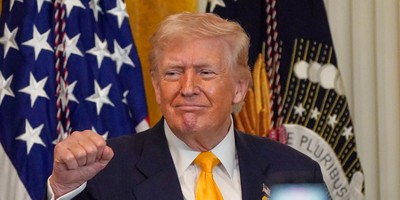Conservatives and libertarians put their love-hate relationship on display today, as a panel of five gathered at the Cato Institute to discuss the issues in Charles Cooke's new book, The Conservatarian Manifesto: Libertarians, Conservatives, and the Fight for the Right's Future. The mood was jovial and upbeat, yet sophisticated and thick with well-reasoned argument. It was an encouraging showcase of big-tent conservatism, and a sign of the future debates that will dominate the GOP.
The panelists included Charles Cooke (National Review), Ilya Shapiro (Cato Institute), Katherine Mangu-Ward (Reason), Ben Domenech (The Federalist), and Trevor Burrus (Cato Institute). The panel spanned the conservative-libertarian spectrum.
Charles Cooke began the event by describing what he means by a "conservatarian." He said there are really two kinds of conservatarians: (1) A conservative who rejects the big-government, "compassionate" conservatism of the Bush administration, and (2) a conservative who generally embraces the GOP's party platform, minus the social issues (like same-sex marriage, or marijuana). The GOP's ranks have swelled with both of these types of conservatives in recent years, particularly in protest to the Obama administration's overreaches, but also due to a more socially liberal youth population. Cooke said this is not necessarily a new development (same-sex marriage notwithstanding), but is actually a reversion to Republican values from the 1980s and 90s. He said the Bush years were something of an "aberration" in the conservative movement, and that "the center of gravity has moved back" toward the values of Reagan and Gingrich.
Katherine Mangu-Ward described the conservative-libertarian relationship — which developed most fully in the post-WWII era of "fusionism" — as an often "abusive" one. She expressed the libertarian frustration that conservatives seem eager to band with libertarians when Democrats are in power, but when Republicans regain power, they are almost as quick to throw off the libertarians. Mangu-Ward acknowledged the real philosophical divisions between conservatives and libertarians, but stressed that the two can, and must, work together on a host of public policy issues.
Recommended
Ilya Shapiro, a senior fellow at Cato, called himself a "big tent kind of guy" and a "classical liberal." Shapiro is a libertarian legal scholar who supports same-sex marriage, but said that "it takes all kinds" in a party like the GOP. He highlighted two criticisms that Charles Cooke makes in his book, one of libertarians and one of conservatives. First, libertarians are often naively eager to strip down important institutions that give order and meaning to society, and they overestimate the ability of logic to satisfy particular needs. But second, conservatives tend to place too much faith in the inherent authority of history and society's institutions, and this leads them to absolutize policy prescriptions from the past that may not be apt to contemporary problems. Ilya acknowledged the strength of these critiques and maintained that the conservative-libertarian fusion can serve to mitigate these weaknesses.
Ben Domenech, publisher of The Federalist, offered two problems that plague the conservatarian movement. First, the post-WWII "fusionist" movement failed to shore up federalism. Instead, states systematically lost their power to the federal government as "successful" state policies became nationalized. States began to depend on federal grants, largely derived from taxpayers in other states — and this amounted to a simple socialistic form of wealth redistribution. Second, he said that "social liberalism" no longer means what it used to mean. It once meant true tolerance and a negative view of liberty. Now, it often denotes positive liberty where true personal "freedom" requires wealth redistribution and personal affirmation. He derided the toxic culture of political correctness, which silences dissent and punishes the dissenters by forcing their conformity.
Cooke responded by heartily affirming Domenech's call to focus on restoring federalism, which allows states to act as the founders intended: as laboratories of democracy. Mangu-Ward cautioned that conservatives are rarely full-blooded federalists and that "fair-weather federalism" would likely win the day. Cooke responded that this is largely inevitable, as perfect adherence to federalism is not always practical.
One interesting question came when Trever Burrus, a scholar at Cato, asked why libertarians consider themselves to even be on the right, rather than the left. Mangu-Ward responded that the "power of inertia" is very real, and that fusionist-era conservatism created the political context for libertarians to remain on the right. She also said that libertarians simply agree with conservatives on far more topics than with liberals, though there is a small bit of room for certain libertarians in the Democratic Party.
Perhaps the biggest gulf between the panelists could be felt on the issue of immigration. Cooke, a conservative more than a libertarian, noted that it is very difficult to have a big welfare state while having a large, free-moving labor population — namely, the illegal immigrants. He said the U.S. needs stricter immigration policy, not simply out of practical need but also out of a concern for cultural continuity. He noted the uniqueness of the American identity — for instance, the fact that foreigners can truly become "American" after living here and adopting American values. This, he said, is simply impossible in other countries where national identity is primarily ethnic and cultural. He said that America's immigration policy should be informed, at least in part, by a commitment to maintain this unique identity, and that a libertarian open-border policy would jeopardize that identity. He said we must ensure that this "fragile cultural setup is here for our kids."
The panel event at Cato was an inspiring show of political unity in the midst of frequent philosophical disagreement. Thankfully, the conservative-libertarian alliance looks stronger than ever. Conservatives can expect the conservative-libertarian dialogue — and occasional tussle — to dominate Republican politics in the decades to come.

























Join the conversation as a VIP Member